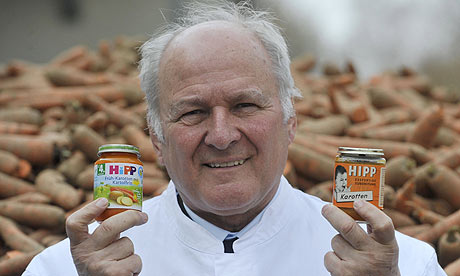Baby food giant hails hungry adult market
German firm Hipp says one in four consumers now grown-ups who find baby food easier to swallow and digest
- guardian.co.uk, Friday 19 March 2010 17.55 GM

Claus Hipp with two jars of Hipp baby food at the company's German HQ. Photograph: Oliver Lang/AFP/Getty Images
Can't be bothered to chew your food? Too tired to cook and looking for a quick meal? It seems that in such circumstances a growing number of adults may consider opening a jar of baby food.
The world's largest baby food manufacturer, Hipp, has said an increasing number of adults are turning to its pre-cooked, pureed meals because they find them easier to swallow and digest.
About a quarter of those who eat the Bavaria-based firm's 100 varieties of pulped meals – from apple and cranberry breakfast to vegetable and beef hotpot – are adults, it says.
Claus Hipp said in recent years his firm's products had grown in popularity, particularly among elderly people, with stewed apple said to be a favourite.
He said the 50-year-old company – the world's largest producer of baby food, with 46% of the market – was increasingly turning its attention to the adult market rather than babies as Europe's population ages.
"Not so long ago, we had twice as many births as now, and that, of course, has a knock-on effect. As our society gets ever older, baby food is showing that it has a future in the adult market," Hipp said at a company birthday celebration.
Despite the fact that birth rates have dropped in most European countries, most notably in Germany, the company's profits rose by €90m last year to €500m (£450m).
A million and a half jars of baby food come off the Hipp production line every day. Hipp said calorie-conscious new mothers saw the meals – which are low in fat, sugar and salt – as a way to help them lose weight after giving birth and were among new customers it had won in recent years. Sportsmen and women looking for a light meal are believed to favour the jars, too.
The company, which recommends its organic meals to babies "at the start of weaning to three years of age", and makes no mention on its packaging of anyone above that age, said it had no intention of relaunching the products for a separate market.
"Older people can often cope with the mashed baby food better than regular meals, but we're not planning to change our advertising to target them … we want to keep our baby image," said Hipp, whose father, Georg, started putting baby food in jars in 1960.
Eileen Steinbock, of the British Dietetic Association, said pureed food could benefit people whose ability to swallow had been greatly reduced through old age, dementia or a stroke, and was already in widespread use in care homes.
But people who could still chew and swallow should continue to do so for as long as possible, she added.
"I wouldn't like to see people being given pureed food just because it's easier for a carer to give it to them that way. It should only be given when it's appropriate or essential," she said.
In addition, the protein content of food declines when it is pureed because extra water is added to help liquify it, leaving it with fewer calories. "That would be a bad thing because a lot of people who require pureed food find it hard to eat enough and are quite likely to be nutritionally compromised and possibly even malnourished," she added.






No comments:
Post a Comment